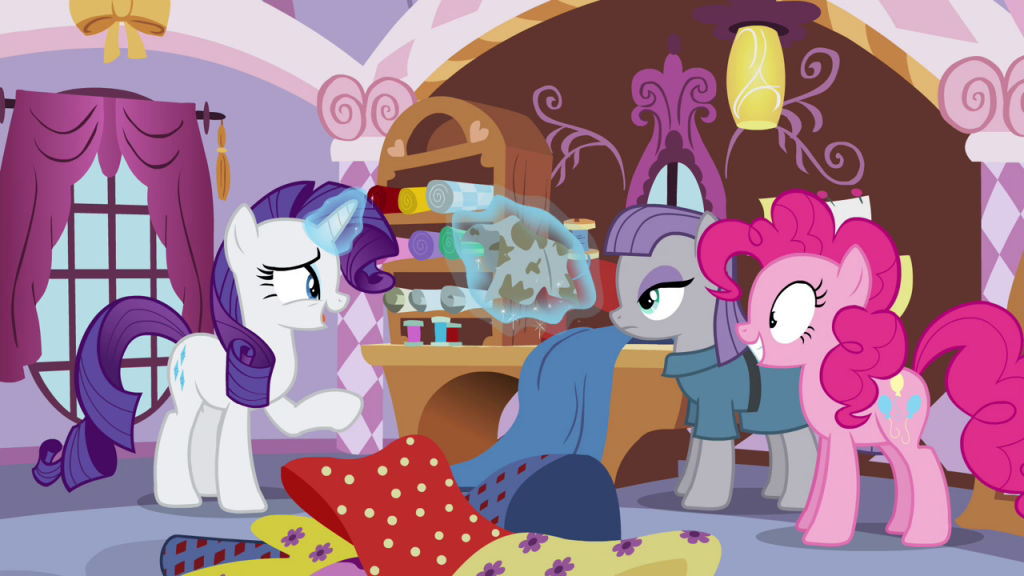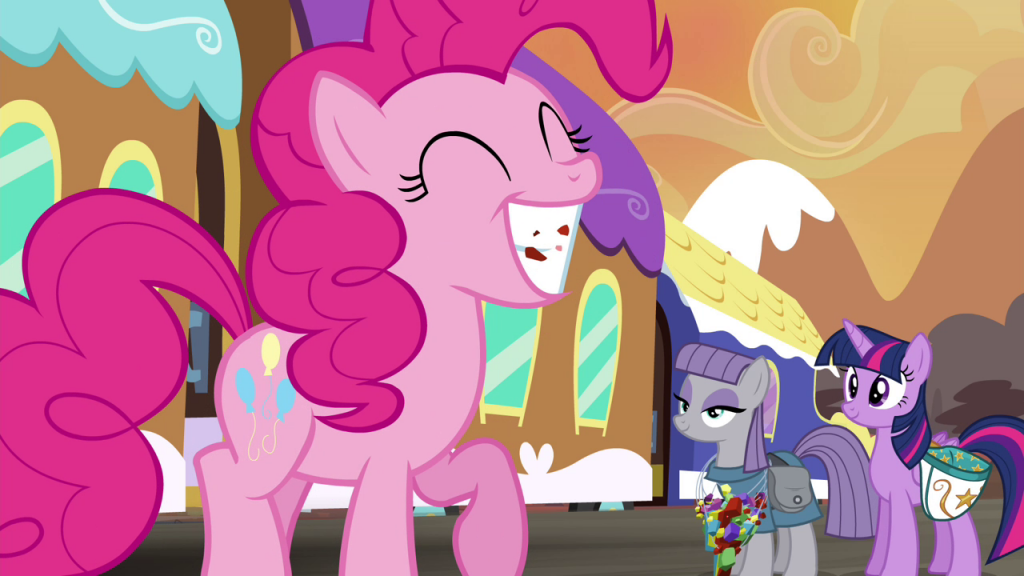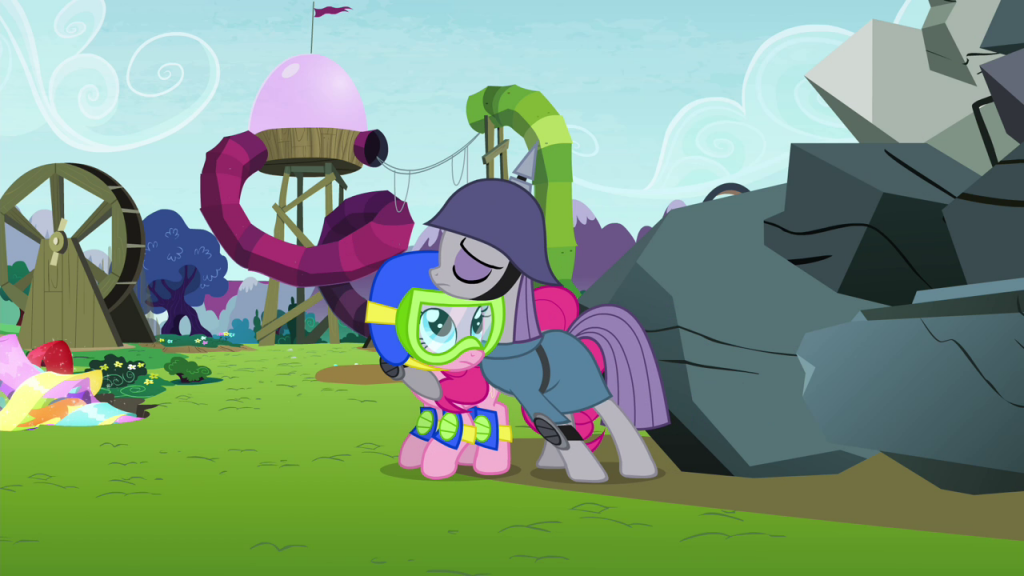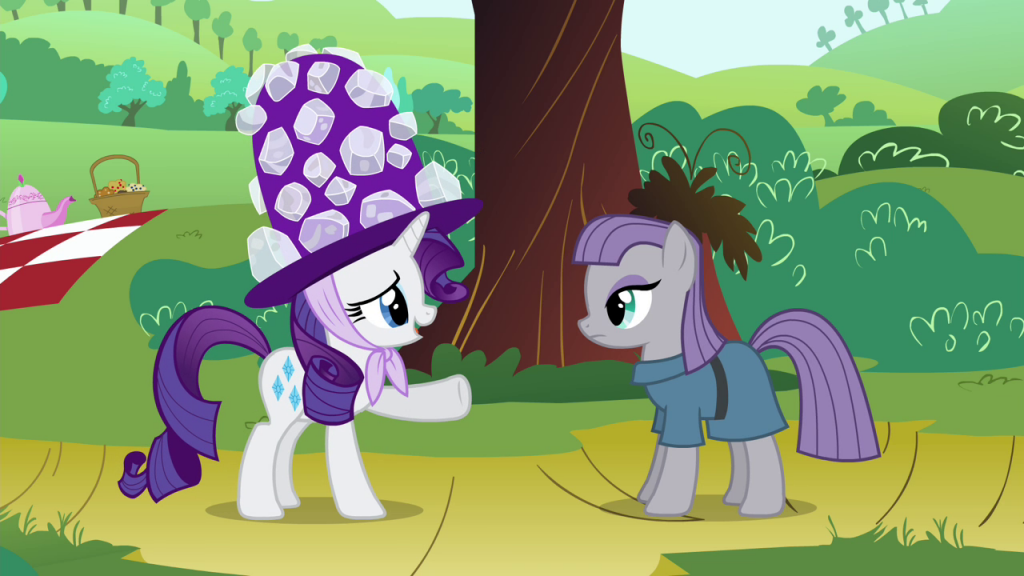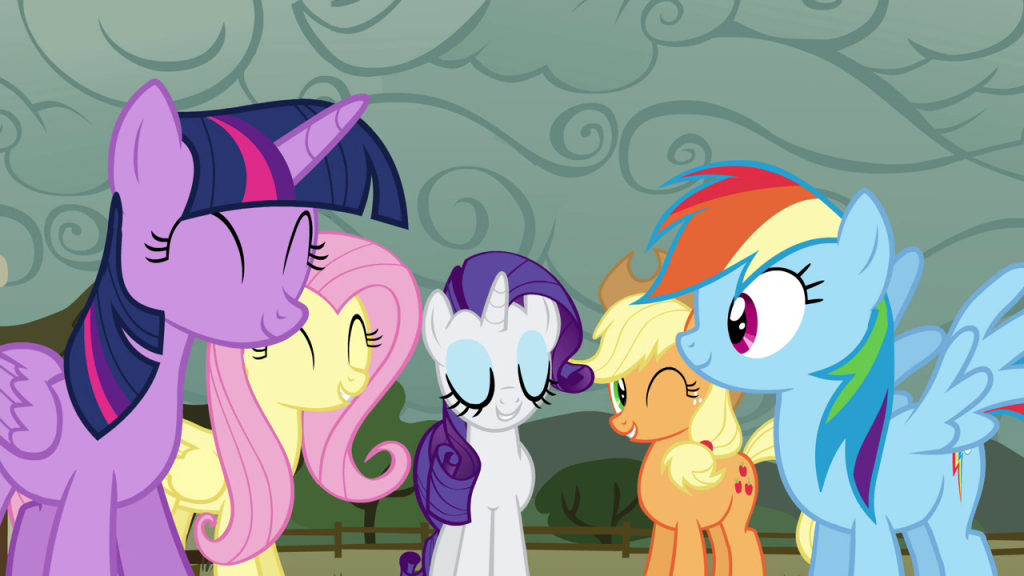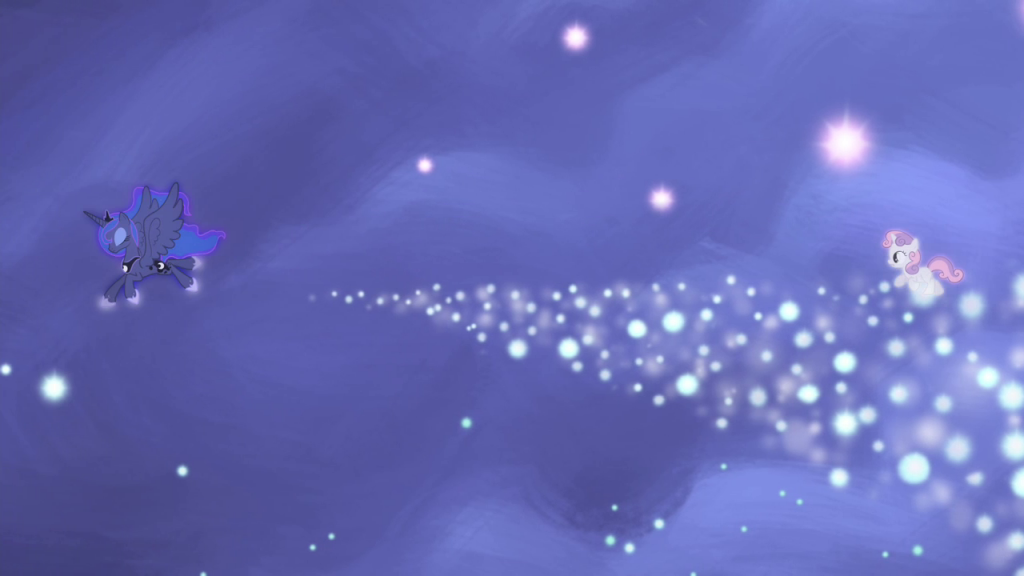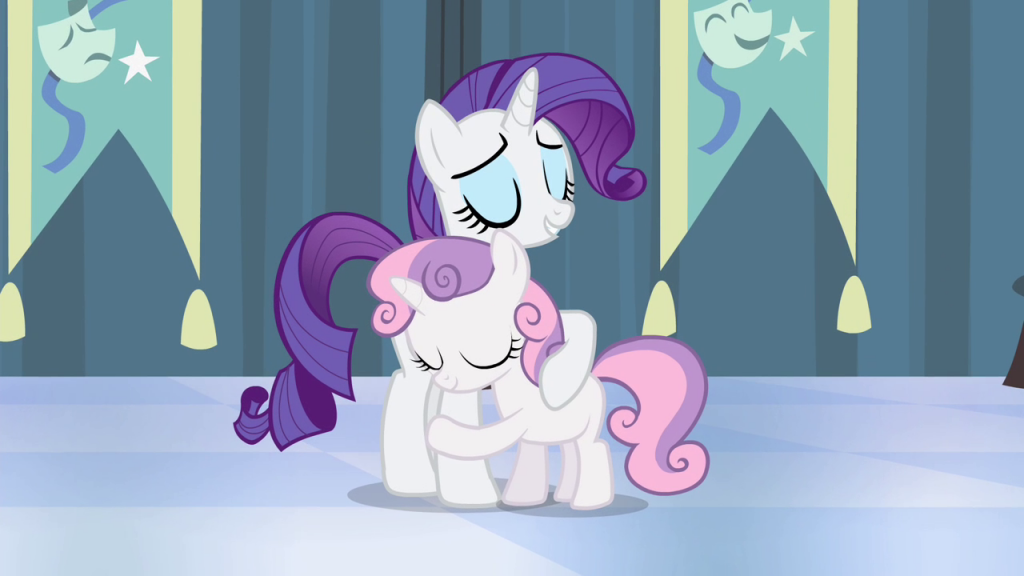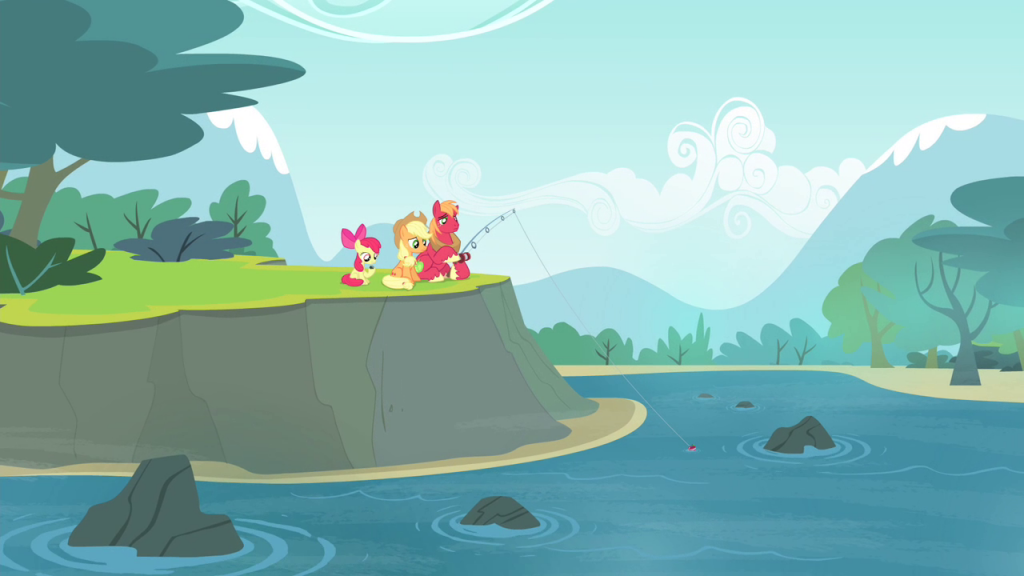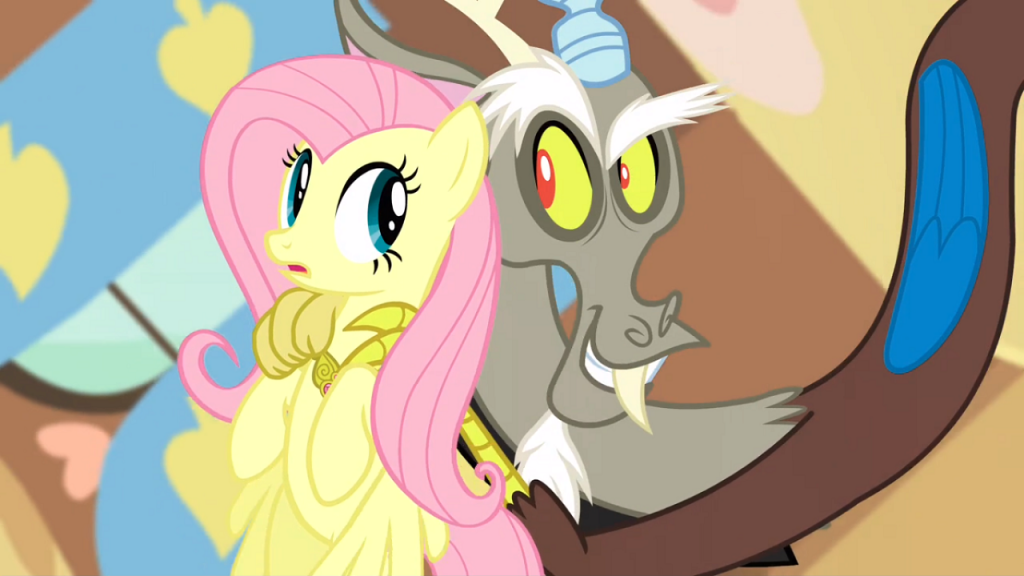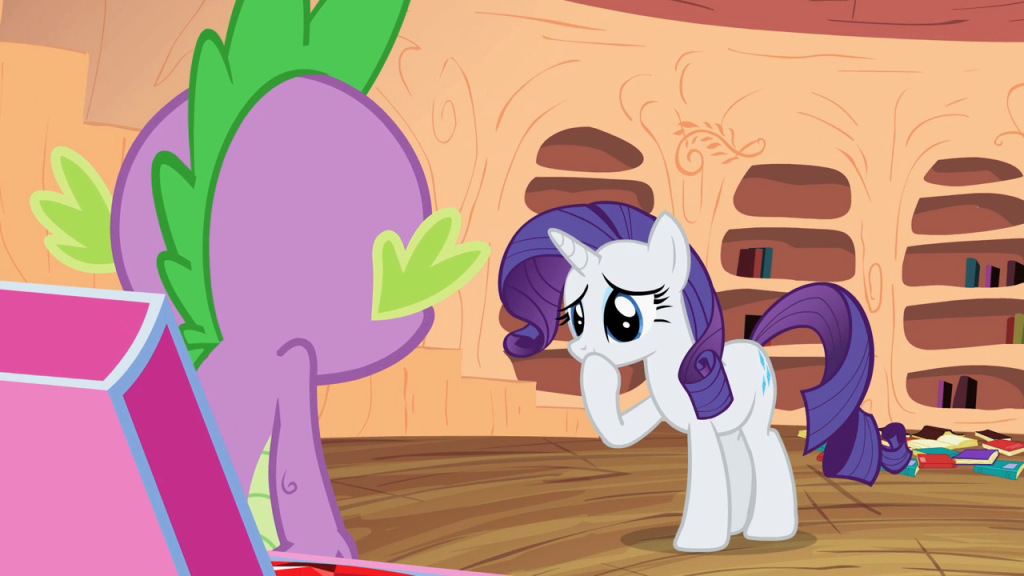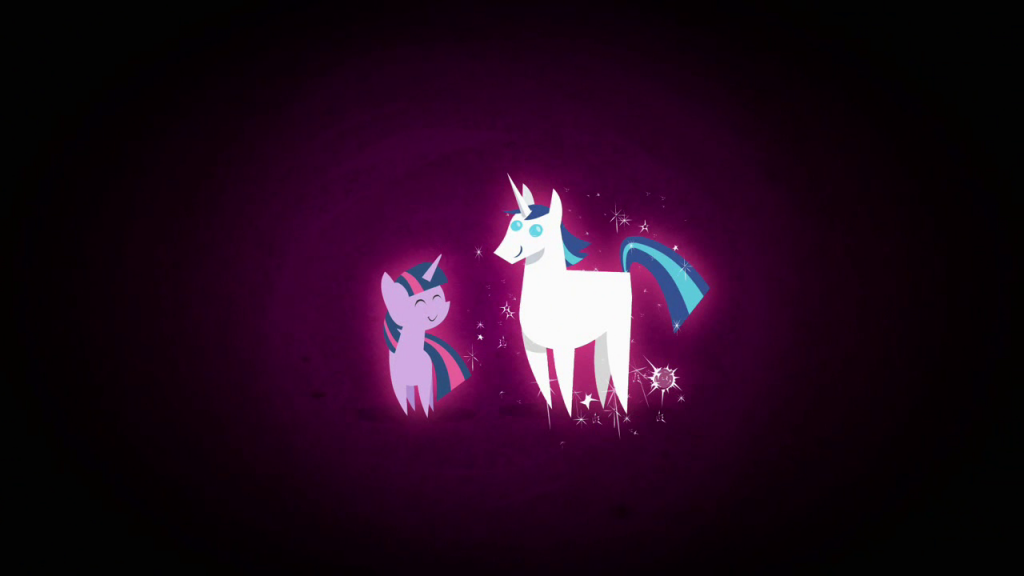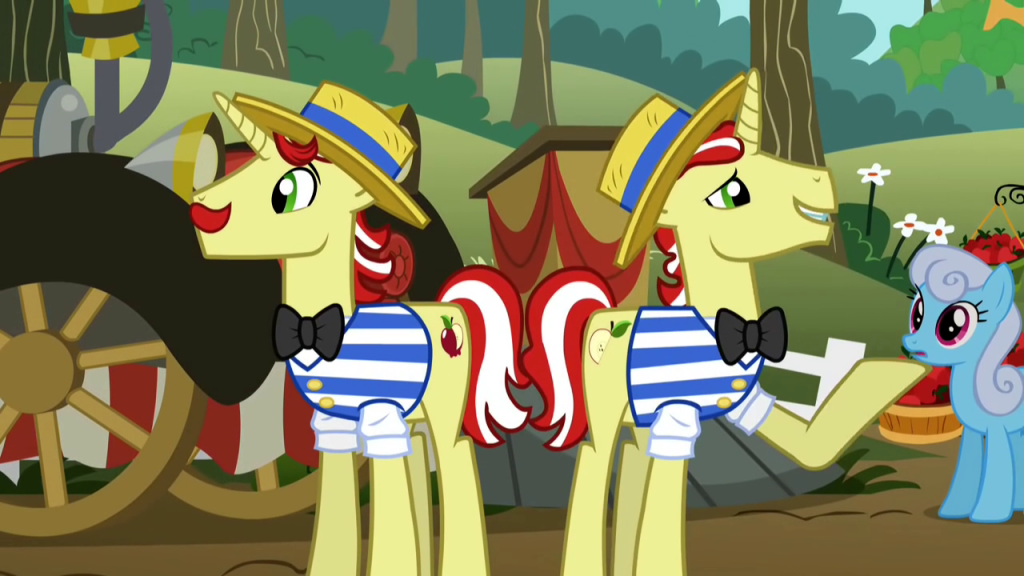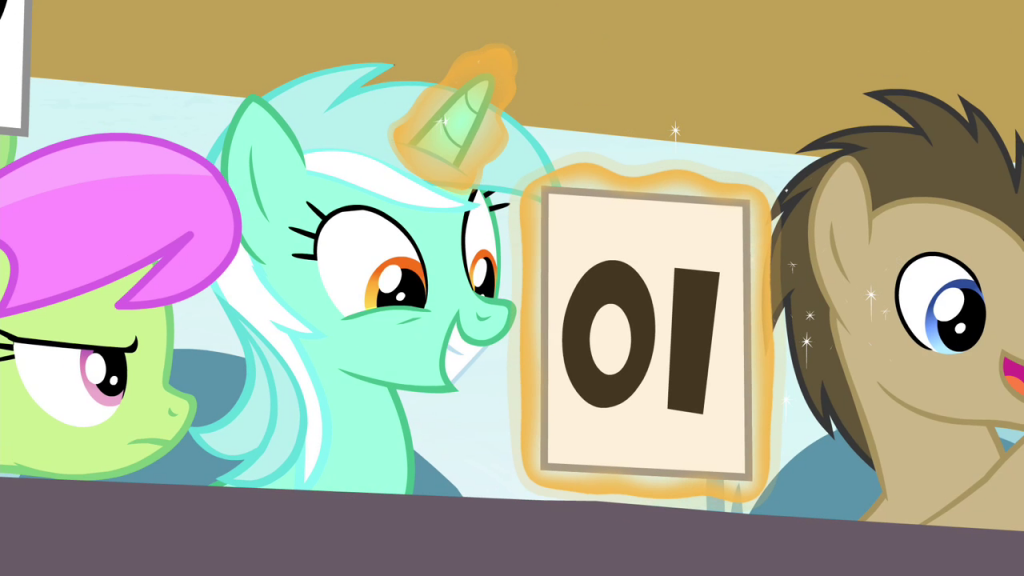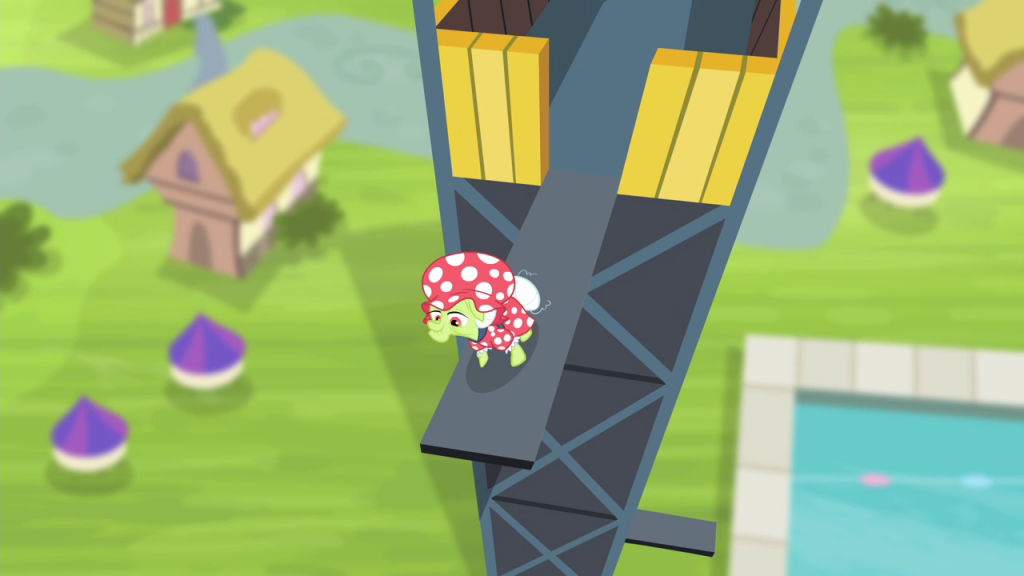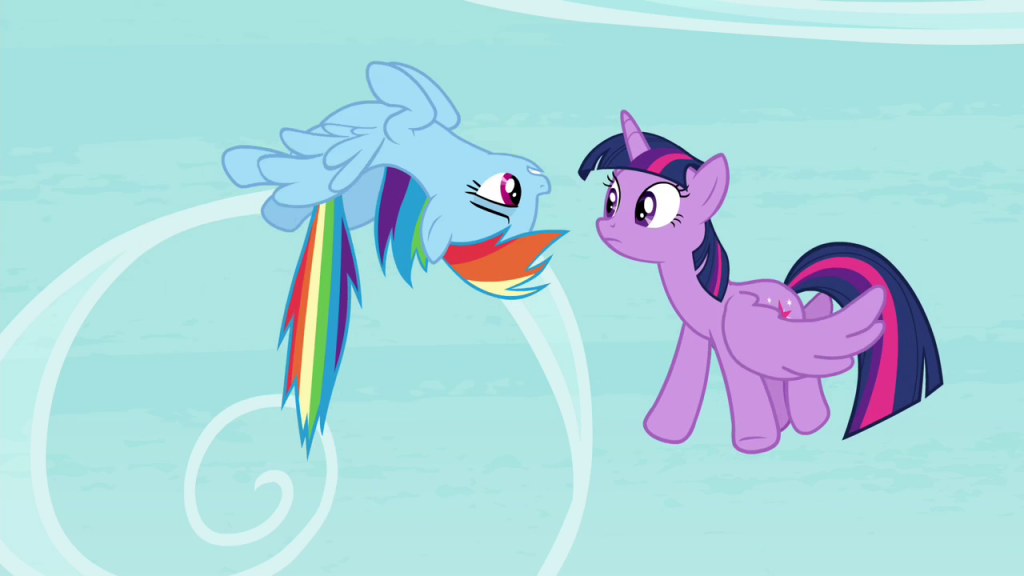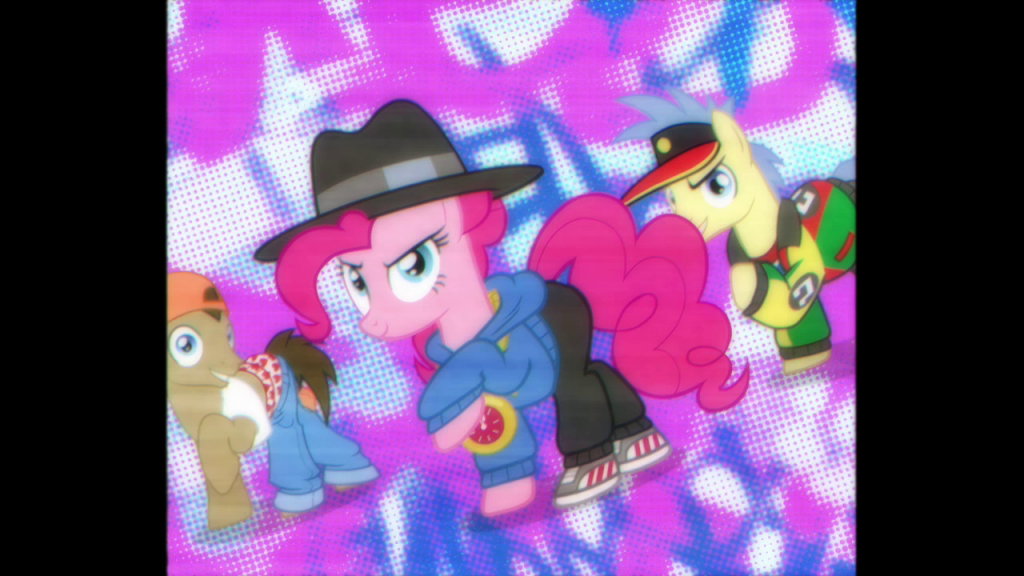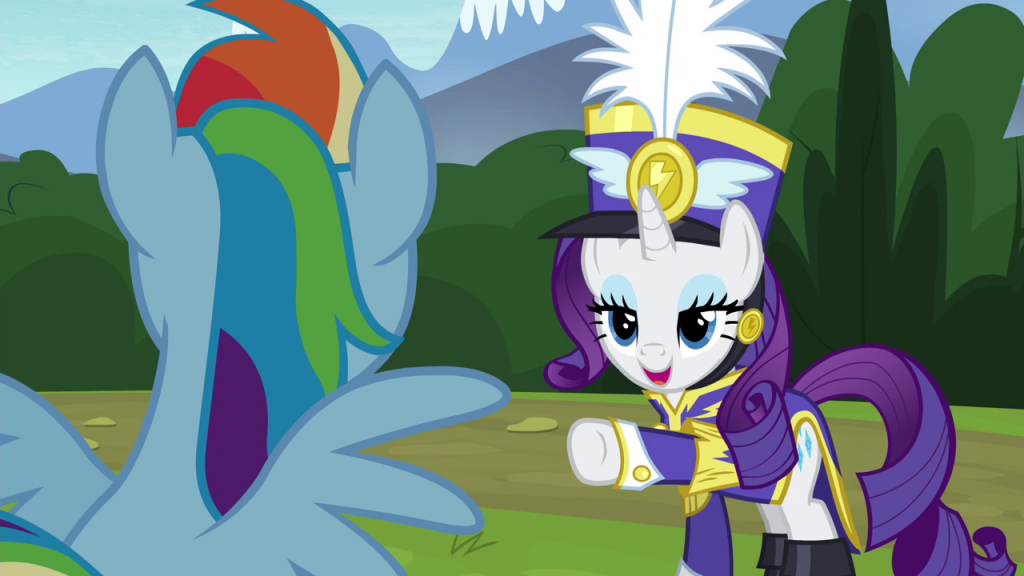Episode 18: Maud Pie
Grade: A+
Maud Pie made me laugh more than Pinkie Pride. More than A Friend in Deed. More than Lesson Zero. As an entertainment viewer, this episode makes me happy because it just might be the funniest episode of My Little Pony. What elevates it even further, though, is that I can also enjoy it from the perspective of a relational viewer.
Opposites attract. Pinkie Pie may be my favorite character in anything, but she’s also probably the MLP character I’m least like. Part of why A Friend in Deed is my second favorite episode is the juxtaposition between an outgoing genki girl and a grumpy old coot. Pinkie loves poor Cranky (as do I) and he wants no part of it, trying to snark his way out for two-thirds of the episode. Sometimes friendship isn’t magic despite the very best of intentions.
Maud Pie, by new writer Noelle Benvenuti, has even better character dynamics than A Friend in Deed in a similarly-themed episode about opposite personalities. While I “relate” much more to Cranky than Pinkie, I also relate much more to Pinkie’s sister Maud than Cranky. I don’t show my enthusiasm for very much (Maud only once cracks a smile), I connect with very few people (Maud fails to click with any of the Mane 6 other than her sister), I’ve been a fairly talented “Asian kid” stereotype with video games but I’m not competitive (Maud destroys Rainbow Dash in a rock-throwing competition but also doesn’t like winning), and I’m even such an awful person that I don’t really care for cake or chocolate (Maud doesn’t like candy).
“But I do love Pinkie Pie.” -Maud Pie
You said it, Maud.
What makes this a much warmer episode than A Friend in Deed (“Smile Song” notwithstanding) is that Pinkie doesn’t have to do anything to earn the love of her sister. In fact, none of Pinkie’s friends can do anything to impress Maud. Why? Because here in Maud Pie, friendships aren’t founded on reciprocity or positive symbiosis. In other words, friendships aren’t formed for utilitarian reasons. They aren’t rooted in the actions that ponies perform, but in the characters of who they are.
Now, granted, Aristotle believed that virtue (or character) is formed by performing certain actions. Am I justified in drawing a distinction between “actions” and “character”? To that I say that actions are caused by a preceding intention. Intention begets action, but intention itself is born of character. What character is born of, though, I admittedly don’t know. While determinism would solve it (whether in naturalistic or Calvinistic flavor), I reject the logical conclusion of determinism. If all actions are merely a product of chemical reactions based on initial conditions, then there’s no such thing as intentionality—indeed, there’s no such thing as rationality. In a deterministic system, whatever one believes is the only thing that one could believe, meaning that no one actually thinks any more than a rock thinks, that in fact “thought” itself is an illusion—
Oh. Sorry. Forgot that’s only interesting to philosophy lovers like me. =P (In fairness to determinism, this episode does feature a rock eating a sandwich.)
Anyway, the beauty of Maud Pie, beyond comedy that can’t be adequately expressed in a text review, is the questions it raises about the nature of friendship. While I’ve mentioned that My Little Pony would be Plato’s worst nightmare, sometimes an episode like this comes along and makes me wonder otherwise.
In a show that has been about imparting moral lessons from the beginning, Maud Pie is astonishingly amoral, just the way I like it. There’s no grand “resolution” or easy fix; none of the ponies truly become her friends and she’s not especially their friend either. They accept their differences and that’s it. “This is how things are,” the episode expresses, leaving the viewer to wonder why they are as they are and what it means.
Pinkie Pie Focus
One subtle thing I like that goes completely unmentioned and unreferenced is that Maud Pie and Gummy are very much alike. We as viewers see nothing more than blank stares, but Pinkie knows their internal emotional states through her intuition and closeness to her sister and pet. Bonds of love may go unspoken, but they’re still present and it may only take time to recognize them.
Rarity Focus
This is my eighth favorite episode, but it would be even higher if not for one flaw: Rarity would never wear this hat.
Rainbow Dash Focus
If Castle Mane-ia and Power Ponies are secret Rarity episodes, Maud Pie is a secret Rainbow Dash episode. She’s an arrogant and sarcastic character and Maud Pie lets her play to her every natural strength: she gets trolled by a trick game so we can see her impotent rage and beaten in a competition so we can see her arrogance get knocked down, but then ultimately delivers the closest thing to a moral (“We’re totally cool with it [Maud being so different]”) so we can see her softer side underneath her brash exterior.
Episode 19: For Whom the Sweetie Belle Toils
Grade: B
With Sweetie Belle being my favorite of the Cutie Mark Crusaders, Rarity being my favorite pony (Pinkie Pie is better, but she’s a physics-bending goddess who only chooses the appearance of a pony), Luna being my favorite princess, and Sisterhooves Social scoring an A+, I should probably enjoy this episode about the relationship between two sisters and a freaky dream sequence starring Princess Luna more than I do. What can’t be taken away from For Whom the Sweetie Belle Toils is an amazing visual sequence set in a fully-realized dreamscape.
What can be taken away is that I don’t feel anything in this episode. It’s not funny and it’s not all that touching, which has been my common thread with Dave Polsky episodes sans Rarity Takes Manehattan, Too Many Pinkie Pies, and half of Feeling Pinkie Keen. (I do love Keep Calm and Flutter On, but that has almost everything to do with the animation and voice acting.) He tends to let his love of heavily-visual scenes overwhelm the emotional core, so events happen and it’s all neat to look at, but caring is another matter.
In short, For Whom… isn’t Star Wars prequel trilogy bad, but it’s not Star Wars original trilogy good. A fine romp that has its moments, but lacks lasting significance.
Rarity Focus
To the episode’s credit, Rarity does show that Sisterhooves Social has stuck with her. Sometimes major events happen and then seem like they disappear from continuity, such as Maud Pie not mentioning the possible family relationship between Maud and Applejack (courtesy of Pinkie Apple Pie) or Flight to the Finish not mentioning Rainbow Dash’s mentoring of Scootaloo (courtesy of Sleepless in Ponyville).
It’s nice to see that a serious episode (and a masterpiece episode at that) left an impact on future episodes.
Episode 20: Leap of Faith
Grade: D+
I suppose, given probability, it had to happen eventually: this episode makes me really uncomfortable. I have a lot of lead-up before I get to why, so skip down to the row of blue stars if you want to only read about this episode. I’m not even going to use many pictures from it since I have a lot to get off my chest here and Leap of Faith doesn’t warrant it.
When you love philosophy, no human reactions can surprise you. After running across people who sincerely believe that the external world is an illusion or that the universe wouldn’t actually exist if there was no one to observe it, what reaction is really so difficult to believe?
So I’m not surprised that people are offended by Feeling Pinkie Keen or Over a Barrel. I’m not surprised that, as I mentioned in part 1, people are offended by Flight to the Finish. I’m not surprised that people are offended by Keep Calm and Flutter On. I’m not surprised that I’ve seen a claim that Twilight’s ascension to princess status in Magical Mystery Cure is anti-democratic and pro-monarchy. I’m not surprised that I’ve been linked to an article by someone who didn’t even watch the show but wrote about how a promotional picture of Rainbow Dash caricatured lesbians.
While I haven’t seen any of these next things, I also wouldn’t be surprised if I ran across someone offended by any of the following:
- Call of the Cutie (cutie marks are an allegory for puberty and the idea that everypony gets one is offensive to a minority of girls who will remain flat-chested; the idea of each pony having a “destiny” promotes determinism and possibly fatalism or nihilism; the fact that cutie marks are obtained without conscious effort may keep kids falsely believing that if they just follow the rules and stick in school then eventually they’ll figure out what they’re meant to do for the rest of their lives (and that if they don’t then something is wrong with them))
- Bridle Gossip (rejecting the possibility of curses in a world of magic caricatures skeptics)
- Rainbow Falls (draws a false dichotomy between pursuing dreams and retaining friends)
- Dragon Quest (anti-frat-boy message or something)
- The Super Speedy Cider Squeezy 6000 (anti-technology message)
- Putting Your Hoof Down (negative portrayal of the cherry salespony is a moral critique of the law of supply and demand)
- The Return of Harmony Part 2 (anti-feminist “I really am weak and helpless” statement)
- Twilight’s Kingdom Part 1 (stereotypical pop culture “angelic” image with a harp and halo (neither are found in the Bible))
- Bats! (oversimplifies a conservationist dilemma)
…among others. That’s just from glancing over the list of episodes.
I wouldn’t even be surprised if someone was offended by any number of core concepts: pegasi flight isn’t possible by the laws of physics and therefore the show is misinforming people about science, anthropomorphized ponies subliminally promote an ethical system in which ponies have equivalent moral worth to humans, a central thematic of friendship marginalizes and devalues natural loners, the relationship between Rarity and Spike promotes bestiality or something, earth ponies are clearly inferior to pegasi and unicorns and this is racism, Rarity and Applejack running businesses and being portrayed as positive characters is capitalist propaganda, Twilight Sparkle finding all her answers in books and being portrayed as a positive character is anti-critical-thinking education system status quo propaganda, Applejack’s portrayal of knowing nothing about anything except apples caricatures or demeans Southerners, people saying things like “Sweet Celestia” elevates Princess Celestia to the status of a goddess and pseudo-legitimizes the way that Roman emperors wanted to be revered as gods, and so on.
I could probably go through a point-by-point rebuttal to all of these if I felt it was a worthwhile use of time, but I don’t and here’s why:
Every claim I’ve ever seen or can even imagine about how My Little Pony negatively influences children relies on superimposing the outside world over a realm of fantasy.
I do understand, of course, that to some extent the show brought this upon itself by explicitly offering morals-of-the-story at the end of almost every episode. I understand that my statement applies to most claims about how the show positively influences anyone as well. I also realize that, just like in modern physics, an observer inevitably influences the system being observed; in other words, viewers always bring part of themselves to the show.
Case in point, I follow two MLP commentators who were each upset by the “B.B.B.F.F.” song in A Canterlot Wedding Part 1 because it hit too close to home. That’s not an “illegitimate” way to interact with fiction, of course. I interacted the same way with Pinkie Pride; I’d just left my job one day earlier and there was Cheese Sandwich singing about vowing to change his life and setting the past free.
Still, even if this isn’t the wrong way to interact with fiction, I also don’t believe it’s the right way. If it was the right way, then everyone who doesn’t go through very similar circumstances is missing out. I jotted down this dialogue for my RPG one day while thinking:
“Who sees the truth more clearly: the one with optimism and naivete, projecting her innocence, or the one with indignation and cause, projecting her cynicism?”
I may or may not use it, but if I do, it’ll be an open-ended question. Answering it would be antithetical to the nature of the character who would ask it; one of her mottos is “May your answers be fleeting and your questions eternal.”
For myself, though—for myself, for now, right here, and with acknowledgment that I may well change my mind tomorrow—my answer is that the one who projects her innocence sees more clearly. She’s less likely to see what isn’t there because she brings less of herself to the table.
So what bothers me about Leap of Faith? Two things, neither of which are me bringing in the outside world. The more minor issue is the Flim Flam Brothers’ new portrayal.
The Super Speedy Cider Squeezy 6000 is an amazing tale about a series of lapses in judgment by every character in the episode except Fluttershy. Rainbow Dash fantasizes about beating Pinkie Pie to the cider and tormenting her by drinking it right in front of her; Pinkie Pie instead beats her to the cider and unwittingly stops her from getting any; Apple Bloom tries to bet the farm (literally) on a contest and usurp the authority of all the older ponies in her family; Granny Smith does bet the farm just because she’s called a chicken; Flim and Flam get overconfident and allow the Mane 6 to participate in the contest; Flim and Flam get booted out of Ponyville because they start serving bad cider from the top of their stock instead of good cider from the bottom of their stock.
It’s such a rich episode with no true right or wrong and with competent antagonists who would contribute something positive to society if they didn’t make a few key mistakes. The best aspect of Flim and Flam is that they’re not pure charlatans.
Until now, anyway. (And in the comics too, admittedly.) I don’t even understand why they’re inventing and selling placebos. Do they need the money? Why would they? The Super Speedy Cider Squeezy 6000 worked perfectly; all they had to do was go to some other apple farm and sell it there. If the ponies on another apple farm didn’t like the 75-25 profit split, just offer them 50-50 or something.
That aside, their sales pitch involves inviting everypony up on stage for a free test, then using a hired pony to fake that their tonic works. What if some other pony takes them up on the invitation first and gets up on stage?
After Granny Smith and Applejack endorse the tonic, it starts selling. If that’s the case, shouldn’t all the ponies be finding out that it doesn’t work? …unless, of course, all the buyers are experiencing the placebo effect just like Granny Smith. If that were true, would Flim and Flam even be in the moral wrong? If everypony experiences the placebo effect, then sure, the tonic might be fake, but then Flim and Flam are “selling” a song that legitimately causes a change in the body.
While not all of morality can be boiled down to utilitarianism, almost any system of morality at least incorporates it, so if Applejack is just stopping people from feeling better, isn’t that in some sense immoral? This is like Immanuel Kant’s categorical imperative vis-à-vis lying vs. ye olde axe murderer objection. The only way I can see that the answer might be no, it’s not immoral for Applejack to put a halt to utilitarian good (just as one should not truthfully answer the axe murderer’s question of where his intended victim is), is because of the frightening reality that is my major issue with this episode.
Granny Smith repeatedly puts herself into situations where, given that the tonic doesn’t do anything, she might well die. This might actually be the very last thing I want to see in the show: grappling with issues of the fragility of life. I’d legitimately rather have a character die outright than watch her walk the line between life and death. Now, on first viewing, there’s a possibility that the tonic works (since the last Flim Flam Brothers invention worked flawlessly) and Granny Smith is perfectly safe to go swimming in a river and jumping off a high dive. On rewatch, though, it’s stomach-turning to see how lighthearted a manner these issues are treated in. This is one of a very small number of episodes that get worse when I revisit it, which is extremely unfortunate.
Considering this is my major issue with the episode, I feel like I should say more, but it’s not a rational objection; it’s an emotional one. I do not like the events of this episode—and I do not like them from an in-universe perspective.
Episode 21: Testing Testing 1, 2, 3
Grade: A+
Thankfully season 4 rebounds with the return of Amy Keating Rogers for Testing Testing 1, 2, 3. Rainbow Dash needs to study for a test to enter the Wonderbolts Reserves and all of her friends except Applejack try helping her out in hilarious and ineffectual ways that, to poor Rainbow, are nothing but nonsense.
We start off with something that comes dangerously close to touching on the question of mind-body dualism. Rainbow Dash asks Twilight to articulate the fundamental nature of memory by asking how words in a book, which are empirically nothing more than ink on paper, can produce an emergent expression of knowledge that, despite its immaterial nature, somehow has the causal capacity to link with her material brain—
Oh. Sorry. Forgot that’s only interesting to philosophy lovers like me. =P But seriously, that’s actually what she asks, just not in so many words.
“How am I supposed to get what’s in there [in a book] in here [in my brain]?” -Rainbow Dash unknowingly ponders metaphysical idealism
Twilight and Rainbow Dash are each characters who are at their best when failing and they proceed to do exactly that for most of the first act (Twilight failing to teach, Rainbow failing to learn), then Fluttershy gets in on it, then—
What is going on in this episode?!
The answer: Amy Keating Rogers knocking another one out of the park with a pitch-perfect emotional core underlying a surface of crazy antics. Testing is, no contest, the most fun and most touching Rainbow Dash episode around. I’d go so far as to say that, while it’s not my favorite episode, it might be the most technically-perfect one yet.
The pacing, especially, is absolutely immaculate. Amy showcases the personality of every pony except Applejack in full through four miniature events: a pop quiz, a play, a rap, and a fashion show. Each of these could normally have been an episode’s centerpiece scene—for example, the fashion show in Suited For Success or the play in The Show Stoppers—but here they’re everyday events that make our heroines’ lives feel that much richer and more dynamic. They’re all breezed through with the smoothest timing and nothing feels the slightest bit rushed.
Testing even redeems the Wonderbolts into heroes worthy of Rainbow Dash’s aspirations instead of the questionable figures they were in Wonderbolts Academy and Rainbow Falls. About the only way this episode could get any better would be for Applejack to finally talk about something besides apples. Cut that out, AJ.
Pinkie Pie Focus
The most baffling sentence in series history: “Pinkie, stop rapping!”
Rarity Focus
Rainbow Dash: Rarity, you look ridiculous.
Rarity: I am going to ignore that comment out of my desire to help you!
So amazing.
Rainbow Dash Focus
I was (surprise) one of those annoying smart kids who never studied and never needed to—and even for me, it’s Rainbow Dash who I relate to, not Twilight. I’m primarily an auditory learner: once I hear something said, I very easily retain it because the wording, pitch, and inflection all stick with me. I didn’t realize this until my college years, though; all I’d figured out before then was that I never seemed to gain anything from studying. The episode resolution that Rainbow Dash learns best by subconsciously absorbing lessons while flying around perfectly nails it.
The only thing that doesn’t really ring true is that Dash doesn’t know anything at all about her own heroes, the Wonderbolts. I’d find it more believable if, say, Rainbow starts rattling off facts about the current Wonderbolts but then Twilight’s further prodding revealed that she doesn’t know anything about historical Wonderbolts. I do understand there might not have been time for that, though.
Next Time
We cover Trade Ya! through Equestria Games! (The finale will get its own post.) Wasted potential! Not-quite-realized potential! Both wasted and not-quite-realized potential!

